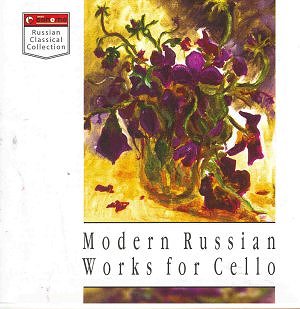In the Boris Tchaikovsky
first movement there are strong
and stormy parodistic Beethovenian elements.
These are blended with caustic material
that owes something to Shostakovich.
A softer facet emerges in the unashamed
sentiment singing out at 3.24 of the
first movement. The Largo and
Andante allow exceptional play
for this. Tchaikovsky sings in this
way as never did Shostakovich; totally
his own man. Although it avoids the
mawkish Tchaikovsky is here playing
fast and loose in the no-man's land
between sentimentality and piercing
beauty. He is not alone in this: Sviridov,
Boiko, Silvestrov, Gavrilin and Karaeyev
have done the same. The work is dedicated
to Moise Vainberg whose Violin Concerto
has just been issued in a completely
new recording on Naxos and whose Fifth
Symphony has been issued on Chandos.
Klimov's work
is one of two on this disc for unaccompanied
cello. A chugging scherzo is strongly
Shostakovich-inflected. There is a long
folk-like Elegy with lovely sighing
moments counter-pointed with pizzicato
at 1.10.
Prokudin evinces
a stirring sense of liberation (prelude
1) and of starry chill (prelude 2);
the latter also heard in the solo piano
music of Urmis Sisask.
Prassolova's
long singing line through the piano
impacts stretches back to Miaskovsky.
You can feel music blossoming and un-peeling
as she dismantles the melodic line.
An intense epiphany is reached at the
climax at 7.32. Prassolova shows a tender
attention to melody and its blessing
in renewal.
Another singing work
is Golovin's Elegy for
solo cello. It is very direct-speaking
with melody unequivocally in the fluent
ascendant. This delivers much and promises
more. While there is a Bachian patina
the Elegy is more linked to the
long romantic lines of Rachmaninov.
I would very much like to hear Golovin's
four symphonies.
Rudin is vibrant
and his accompanists sympathetic as
well they might be in the case of the
composer-pianists.
The names of these
composers are linked in various ways.
Tchaikovsky and Golovin were on the
staff of the Gnessin Institute. Prokudin,
Prassolova and Klimov were pupils of
Golovin and Tchaikovsky.
Their works speak without
confusion or the effrontery of elitism
and with unfeigned sincerity. They have
a profound anchorage in the Russian
melodic tradition. Melody and profundity
reward the explorer here.
Rob Barnett
